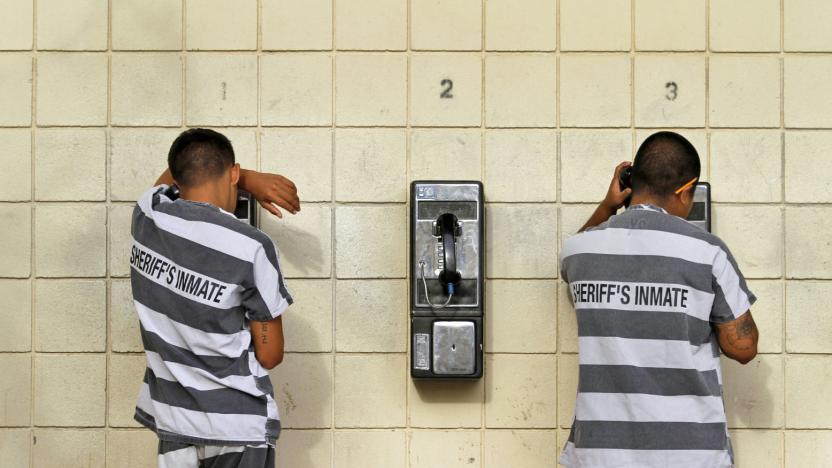Prison
Latest

FCC stops defending caps on prison phone call rates
The Federal Communications Commission's new anti-regulation stance is now affecting prisons. BuzzFeed News reports that the FCC is no longer defending two key parts of its caps on prison phone call rates: limits on intrastate call rates and the methods used to determine those rates. Ultimately, it's expected to push for eliminating the caps altogether. While this doesn't end litigation from phone service providers attempting to overturn the caps (they're merely on hold, not scrapped), it finds the FCC supporting the very companies it was challenging just weeks earlier.

How inmates tried to coordinate a nationwide prison strike
Today is symbolic for an oft-forgotten group of Americans: Prisoners. 45 years ago, those locked away in the Attica Correctional Facility in western New York state went from protesting for more rights to a full-blown riot put down by force. In recognition, the incarcerated across America are rallying to protest the injustice of prison labor, which could become the largest mass-strike in US prison history. But how did they coordinate so many people using only written letters and telephones as restricted by law? Answer: they got around it and connected with each other — and the outside world — over Facebook, Twitter and YouTube.

UK grants new powers to remotely block illegal prison mobiles
Mobile phones have to be one of the most valuable kinds of prison contraband, where they're used for keeping in touch with loved ones all the way through to running criminal empires from behind bars. According to the UK government, close to 15,000 handsets and SIM cards were confiscated last year alone. But thanks to new powers granted to prison and police officers, they can now be disconnected remotely, removing the need to physically find the things to take them out of circulation.

Wisconsin court deems sentencing algorithm constitutional
If you were hoping that Wisconsin would open up the sentencing algorithm it uses to help determine prison time, you're about to be disappointed. The state's Supreme Court has ruled that the use of the the COMPAS algorithm doesn't violate your constitutional right to due process. The decision rejected plaintiff Eric Loomis' complaints that the code is both proprietary (thus preventing him from challenging its accuracy) and was too central to his 6-year prison term. There were "other independent factors" leading to the sentence, the Supreme Court says, and you don't need to reveal the algorithm's source code when it's only one consideration among many.

White House launches a data initiative to reduce prison numbers
Just before the holiday weekend last week, the White House launched the Data-Driven Justice Initiative (DDJ), a new effort that will use wider data access to reduce prison populations. The US has been widely criticized for its tendency to over-incarcerate citizens -- it accounts for 25 percent of the world's prison numbers, even though it houses only 5 percent of the world's population. And all of that comes at a cost: 11 million people are processed through America's local jails every year, the White House says, costing around $22 billion. As part of the DDJ, 67 municipalities across the country are banding together to use data-powered strategies to keep low-level offenders out of jails, primarily by pushing them towards mental health and addiction help.

Wisconsin's sentencing algorithm faces a court battle
Many people are nervous about the prospect of using algorithms to predict crime, and a legal battle in Wisconsin is illustrating why. The state's Supreme Court is close to ruling on an appeal from Eric Loomis, who claims that the justice system relied too heavily on its Compas algorithm to determine the likelihood of repeat offenses and sentence him to 6 years in prison. His attorneys claim that the code is "full of holes," including secret criteria and generic decisions that aren't as individually tailored as they have to be. For instance, they'll skew predictions based on your gender or age -- how does that reflect the actual offender?

British YouTubers jailed for faking an art gallery heist
Four members of the YouTube channel Trollstation have been jailed staging hoax raids on two prestigious London galleries. The group pleaded guilty to two counts of using threatening words or behaviour after they performed a fake kidnapping and caused mass panic at the National Portrait Gallery and Tate Britain in July 2015.

Journalist Matthew Keys gets two years for aiding Anonymous
Convicted journalist Matthew Keys was sentenced to 24 months in prison in federal court room. Keys was found guilty in October 2015 of giving Anonymous login credentials that allowed a member of the group to deface a Los Angeles Times article back in 2013. Keys contends that he was working on an article about Anonymous and did not help the hacktivist collective gain access to the publication's site. Keys was convicted under the Computer Fraud and Abuse Act. Assistant U.S. Attorney, Matthew Segal had asked the court to sentence Keys to five yeas. Instead, he was sentenced to 24 months in jail which will be followed by two years of supervised release. After the sentencing, Keys tweeted that his lawyers would file a motion to stay the sentence. 2 years. We plan on filing a motion to stay the sentence. — Matthew Keys (@MatthewKeysLive) April 13, 2016 At the time of the hack, Keys was working for Tribune Media-owned Fox 40 in Sacramento. He was convicted of sharing the login credentials of the company's CMS with Anonymous. Hacker "Sharpie" then used the information to deface an article that was live on the LA Times site for 40 minutes before an editor noticed the digital vandalism and fixed the issue.

Chinese man pleads guilty to stealing US aerospace secrets
Some two years after the United States charged Chinese national Su Bin as part of a conspiracy to steal aerospace info, he's pleaded guilty to the crime. For that he'll face a maximum sentence of five years behind bars and a $250,000 fine "or twice the gross gain or gross loss resulting from the offense;" whichever is a higher amount, according to the Department of Justice. Part of his deal entailed admitting that the data pilfered (including info from the U.S. Munitions list) was done so expressly for monetary gain.

Software glitch let 3,200 US prison inmates out early
Washington's Department of Corrections has been forced to admit that around three percent of the prison population has been released early since 2002. The issue, which was admitted yesterday by Governor Jay Inslee, surrounds a software glitch that's been incorrectly calculating the duration of inmates sentences. According to the Seattle Times, a Supreme Court ruling mandated that good time credits should be used to reduce prison terms. When the DoC's computer systems were amended to take that into consideration, however, there was an inaccurate calculation of how long a good time credit was. Unfortunately, it wasn't until 2012 when the family of a victim raised the issue of a prisoner's release, that the department became aware.

Recommended Reading: The harsh realities of internet fame
Recommended Reading highlights the best long-form writing on technology and more in print and on the web. Some weeks, you'll also find short reviews of books that we think are worth your time. We hope you enjoy the read. Get Rich or Die Vlogging: The Sad Economics of Internet Fame Gaby Dunn, Fusion Just because you're famous on the internet, doesn't mean you're rolling in the dough. This piece takes a look at the harsh realities of being famous on the web and trying to survive in the real world. As it turns out, YouTube fame, for some, isn't all it's cracked up to be.

US prisons allegedly record more inmate calls than they should (update: response)
It might not just be everyday people who've been subject to illegal surveillance -- prisoners may be victims, too. An anonymous hacker has given The Intercept phone records showing that prisons have recorded "at least" 14,000 calls between inmates and lawyers through software from Securus. As you might imagine, that potentially represents huge violations of both the attorney-client privilege and Sixth Amendment protections against interference with your right to counsel. Prosecutors could use these recordings to cheat at trial by getting case details that they're not supposed to know. In fact, a recent Austin lawsuit accuses Securus of contributing to just that kind of trickery.

The federal prison bureau needs help stopping contraband drones
The Federal Bureau of Prisons issued a Request for Information on Wednesday soliciting ideas and proposals for "countering, mitigating and/or interdicting the impact and possible nefarious intent of unmanned aerial systems." That is, the Feds need some help countering the drones they suspect are routinely delivering drugs, weapons and other contraband into America's 122 prison facilities.

FCC caps 'excessive and egregious' prison telephone rates
Who are the criminals in this story? The FCC has acted to reduce what it calls "excessive rates and egregious fees" of up to $14 per minute charged by federal and state prisons. The commission notes that while contact between inmates and families reduces recidivism, "high inmate calling rates have made that contact unaffordable for many families, who often live in poverty." It started the action after receiving a petition from Washington, DC grandmother Martha Wright, who requested relief from the "exorbitant" rates she paid to call her grandson in prison.

Rogue federal agent to serve 6.5 years for Silk Road scandal
Former federal agent Carl Force has been sentenced to six-and-a-half years in prison for his role in obstructing justice while investigating the online black market, Silk Road. As Reuters tells it, prosecutors were aiming for a longer sentence (87 months, or 7.25 years) but the defense was aiming for a brisk four-year sentence due to a history of mental health issues. To back up that claim, Force said he didn't understand a lot of what he was doing. Even the movie deal? Ars Technica reports that Force will have to pay $337,000 in restitution to a CoinMKT customer and $3,000 to an arrested Silk Road employee by the name of Curtis Green. If you'll remember, the last federal agent involved with the corruption charges, Shaun Bridges, is awaiting trial, while Silk Road's mastermind Ross "Dread Pirate Roberts" Ulbricht was given a life sentence for his crimes. [Image credit: Tim Arbaev for Getty]

The last Pirate Bay co-founder has served his jail time
For years, authorities had played a game of cat and mouse with the co-founders of file-sharing site The Pirate Bay. The long game eventually paid off, with Peter Sunde, Gottfrid Warg and Fredrik Neij all being sent to prison within a six month period. Sunde and Warg have since walked free, leaving Neij as the final site founder still serving a custodial sentence. At least until now. TorrentFreak reports that the 37-year-old has been released after serving two-thirds of what should have been a ten-month stretch.

Fraudster's phoney email tricked prison into releasing him
In the movies, a daring prison escape usually involves a carefully orchestrated plan filled with intricate tunnels, ingenious bribes and chaotic distractions. But for Neil Moore, performing a similar breakout in the real world was so much simpler. With the aid of a smuggled mobile phone, he was able to set up an email address with a domain that closely resembled Her Majesty's Court Service. He then sent a forged letter approving his release to the prison, hoping they wouldn't inspect the document or sender's credentials too closely. Low and behold, the wardens were convinced of its authenticity (despite misspelling "Southwark" Crown Court) and Moore walked free in March 2014.

Drone smuggling prison contraband gets stymied by stupidity
Smuggling contraband into prison via drone is a bad idea, even if you toss morals out the window: the aircraft are noisy, flashy, and require a good amount of skill to fly in undetected. However, some British crooks didn't get the memo. Police report that unidentified suspects tried using a drone (a DJI Phantom 2 Vision, to be exact) to sneak drugs, phones and weapons into Bedford Prison, only to be foiled when the machine got caught in barbed wire. Prisoners supposedly paid an inmate to accept a delivery from friends on the outside -- if so, there are quite a few people in hot water right now.

The Escapists cracks open Xbox One next month
Mouldy Toof Studios' prison-breaking game The Escapists will launch on Xbox One on February 13, the developer announced today. Additionally, the game will launch in full on Steam on that day after nearly six months on Early Access. In it, players plot an extravagant prison escape while abiding by the prison's schedule, crafting weapons and tools while not raising suspicion from guards. The Escapists' full version will feature six unique prisons and six different methods to escape from them, such as digging your way out or taking over the whole facility. The game also includes ten prison jobs that players can perform in order to learn useful skills relevant to their escape strategies. The game is currently $15 on Steam Early Access. Worms series developer Team 17 signed on as The Escapists' publisher in February 2014. [Image: Mouldy Toof Studios]

Former Silicon Knights dev sentenced in child pornography case
Former Precursor Games and Silicon Knights designer Ken McCulloch was sentenced this week in an Ontario Court of Justice in St. Catharines, Canada on child pornography charges. Judge Joseph Nadel sentenced McCulloch to 12 months of time served; McCulloch has been jailed since his arrest in late June 2013, after he pleaded guilty to making child pornography available. According to The Welland Tribune, Niagara Regional Police also charged McCulloch with sexual assault, forcible confinement and sexual interference during his time in jail in the past year. McCulloch will remain in custody, returning to court on August 26 to answer to those charges. As a result of the initial sentencing, McCulloch will be added to the provincial sex offender registry for the next 20 years. Judge Nadel also ordered McCulloch to stay away from any child under the age of 16 and from schools, parks, recreation centers and public pools for 10 years.












